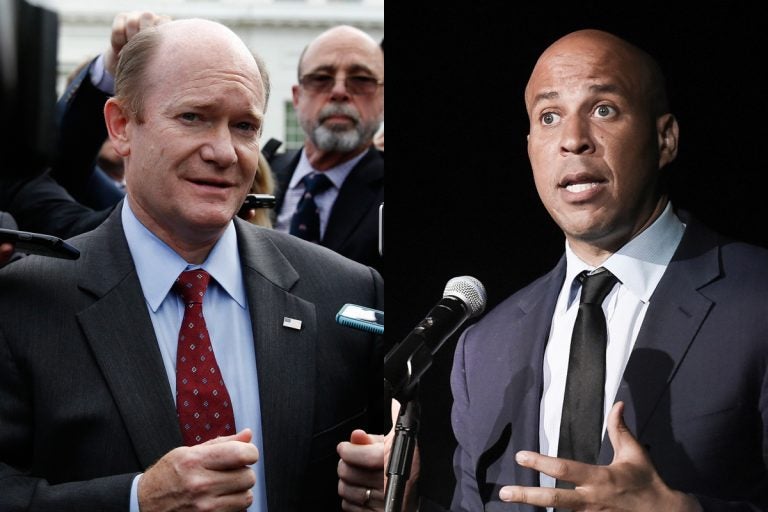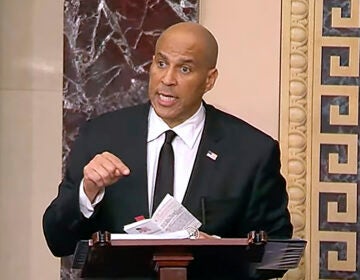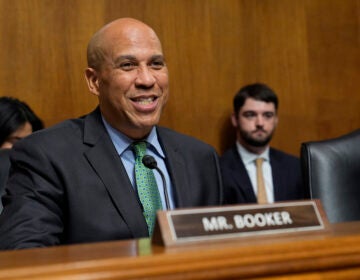Booker, Coons lead bipartisan efforts to block Trump from firing special counsel
U.S. Sens. Cory Booker of New Jersey and Chris Coons of Delaware are behind two bipartisan bills seeking to block President Trump from firing special counsel Robert Mueller.
Listen 4:35
Sen. Chris Coons of Delaware and Sen. Cory Booker of New Jersey are leading efforts to block the firing of special prosecutor Robert Mueller. (AP file photos)
The U.S. Capitol erupted with whispers and energetic, highly partisan TV interviews from lawmakers of all stripes last month after Robert Mueller, the special counsel in the investigation into Russian interference in the 2016 election, announced he secured a guilty plea from a former Trump campaign adviser who admitted to lying about his contacts with Russian officials.
Because many lawmakers fear the president will fire the special counsel, Democratic Sen. Chris Coons of Delaware is sponsoring a bill that would allow Mueller to contest dismissal by the White House.
“I think it’s more important than ever that we send a signal that the legislative branch is going to insist that the executive branch follow the rule of law,” Coons said.
Former White House chief strategist Steve Bannon reportedly has been talking to the president and urging his administration to withhold documents from Mueller.
That, said Coons, is dangerous.
“He is urging people to obstruct justice and to undermine an active investigation. I think Republican leaders and the administration would be wise to ignore Bannon’s call to obstruct justice,” the senator said.
‘Nothing to do with who’s in the White House’
Coons teamed up on the legislation with Sen. Thom Tillis, R-North Carolina, who said he has no fear that Trump will fire Mueller. For Tillis, it’s all about Congress taking the driver’s seat.
“To me, this is a part of a process over things I intend to do over the next few years that relates to Congress reasserting itself where we think we should — it has nothing to do with who’s in the White House right now,” Tillis said.
Democratic Sen. Cory Booker of New Jersey is pushing a proposal that differs slightly from Coons’. While Coons wants post-firing review, Booker wants judicial review before the president can get rid of a special counsel.
“There’s something that’s not right with this law that gives such an imbalance of power to a president, regardless of who that president is,” Booker said.
Booker’s bill is also sponsored by influential Republican Sen. Lindsey Graham from South Carolina. Like Tillis, Graham insisted he does not believe Trump will try to fire Mueller.
“There’s no evidence, no suggestion at all, that the president is going to do anything with Mueller. Trust me, I don’t believe there’s any movement at all by anybody in the White House to get rid of Mueller,” Graham said.
So why is he sponsoring the legislation? Graham said he wants to protect the president from making a rash decision. He said firing Mueller would end Trump’s presidency.
While Coons and Booker fear the president will act unilaterally to oust the special counsel, Booker said they’re also trying to make their bills about more than this president.
“If you pull out of the politics of this moment and look at this objectively on checks and balances on presidential power, this is, I think, a very common-sense, credible way to go,” Booker said. “For not just this moment in history, but for 20 years from now, for 40 years from now, for 100 years from now.”
With Bannon calling for Trump to set up road blocks to the Russia investigation, House Republicans from the Delaware Valley region are cautiously signaling the White House to let the probe run its course.
“I believe that the president is being well advised by his attorney, Ty Cobb, to let the investigation proceed, and I believe that that advice should be headed by the president,” said U.S. Rep. Leonard Lance, a Republican from Central New Jersey.
One House Republican is pushing a proposal to limit Mueller’s funding to just six months.
U.S. Rep. Ryan Costello, a Republican who represents a district covering parts of several counties west of Philadelphia, said that’s misguided.
“I don’t support that,” he said. “Because you don’t kneecap an independent counsel who you don’t know how they’re going about fact finding or what they may need to do. There are some strategic considerations behind that.”
Still, if these measures are approved, why would President Trump ever sign them? Supporters contend they can assemble veto-proof majorities. And, at the very least, they say it would be a strong warning to the president.
WHYY is your source for fact-based, in-depth journalism and information. As a nonprofit organization, we rely on financial support from readers like you. Please give today.




